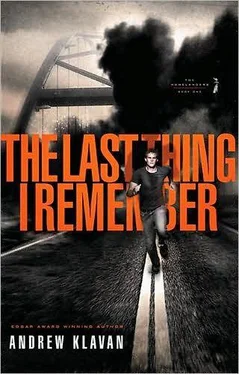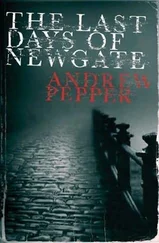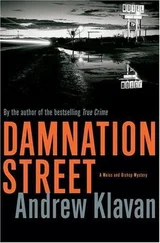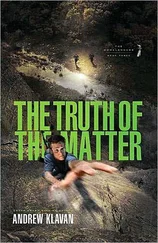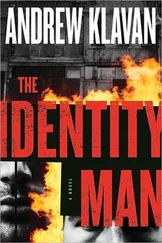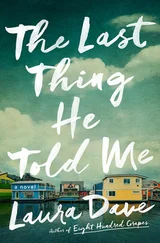Andrew Klavan - The last thing I remember
Здесь есть возможность читать онлайн «Andrew Klavan - The last thing I remember» весь текст электронной книги совершенно бесплатно (целиком полную версию без сокращений). В некоторых случаях можно слушать аудио, скачать через торрент в формате fb2 и присутствует краткое содержание. Жанр: Триллер, на английском языке. Описание произведения, (предисловие) а так же отзывы посетителей доступны на портале библиотеки ЛибКат.
- Название:The last thing I remember
- Автор:
- Жанр:
- Год:неизвестен
- ISBN:нет данных
- Рейтинг книги:5 / 5. Голосов: 1
-
Избранное:Добавить в избранное
- Отзывы:
-
Ваша оценка:
- 100
- 1
- 2
- 3
- 4
- 5
The last thing I remember: краткое содержание, описание и аннотация
Предлагаем к чтению аннотацию, описание, краткое содержание или предисловие (зависит от того, что написал сам автор книги «The last thing I remember»). Если вы не нашли необходимую информацию о книге — напишите в комментариях, мы постараемся отыскать её.
The last thing I remember — читать онлайн бесплатно полную книгу (весь текст) целиком
Ниже представлен текст книги, разбитый по страницам. Система сохранения места последней прочитанной страницы, позволяет с удобством читать онлайн бесплатно книгу «The last thing I remember», без необходимости каждый раз заново искать на чём Вы остановились. Поставьте закладку, и сможете в любой момент перейти на страницу, на которой закончили чтение.
Интервал:
Закладка:
It wasn’t an easy thing to figure. I mean, here I was, on the run again just like yesterday-only now it was much, much worse. Yesterday, I thought only the bad guys were after me. I thought all I had to do was find my way back to civilization and call my parents or the police and everything would be fine. Now I realized the police-the good guys-were after me too. My parents had moved away. I was suspected of killing my best friend. Everyone was against me.
Well, no, wait-not everyone. There was that guy- that guy who’d whispered to me as they lowered me into the police car, who had broken my handcuffs and said I was a better man than I knew. He was on my side, whoever he was. If I could find him, or find this Waterman he was talking about, maybe one of them would help me.
Meanwhile, though, I had another problem, a new problem, a big one. Richard Yarrow, the secretary of homeland security, the man in charge of protecting the country from terrorism. With me a fugitive and the police figuring me for a murderer and a liar, how was I ever going to convince anyone that his life was in danger?
So I sat in that empty room and thought about all this, hour after hour, hugging myself and shivering as the afternoon wore on and the autumn air got colder and blew harder from one broken window to another. After a while, the howls of the police sirens began to fade, first one, then the next, until they were all gone. The helicopter moved away, the chop of its propellers growing softer and softer until I couldn’t hear it anymore. By the time the sun went down and the light at the windows faded, it was quiet all around me.
Darkness came, and I edged over to a broken window. I poked my head around the frame and peeked out at the street three stories below. It seemed empty down there except for the occasional homeless guy shuffling along in the dark.
I was hungry now, wondering how I was going to find a meal. I had no money. I hated to think of stealing something, but I knew I had to eat if I was going to go on.
Finally, I left the brownstone. I went down into the street and stepped out into the chilly evening. It was a weird, kind of naked feeling being outside again. I knew my escape must be on the TV news. I knew they must be talking about me and showing my picture and all that. Maybe they were even offering a reward-you know, for information leading to my arrest. I felt as if my face were a neon wanted poster, a big lighted sign saying: If you see this man, call the police.
Stuffing my hands in my pockets and hunching my shoulders against the cold, I moved down the street. I kept looking around to see if anyone noticed me. Every time a car went by, I pulled up, worried it might be a cop. Once, a police cruiser actually crossed my path, heading down an intersecting street. I edged close to the wall of a building, where the darker shadows hid me until the cruiser had gone past.
I had an idea now. Back home-back in my real life when I was just a regular kid-my church had worked with a homeless shelter. Once a month, people from our congregation would go over there and bring food and cook dinner for anyone who wanted it. Sometimes I was one of the volunteers. The homeless shelter was connected to another church, and I knew that a lot of churches in bad neighborhoods like this one ran soup kitchens and shelters to help the poor.
So I looked for a church. Whenever I came to a corner, I lifted my eyes and scanned the area for a steeple or a cross lifted against the night sky. Each time I saw one, I went toward it to see if there might be a soup kitchen, somewhere for the homeless to get something to eat. Somewhere for me to get something to eat.
Sure enough, on the third try, I lowered my eyes from a steeple and saw a line of hunched men standing on the sidewalk. I moved toward them. They were waiting outside a small building next to the church. It was a homeless shelter with a cafeteria. There was a cardboard sign in the window, saying dinner was available at seven o’clock on a first-come-first-served basis. I got in line with the others. When the shelter doors opened, we began to shuffle inside.
I was glad to get in. I was weak with cold by that time. The building was warm, and the warmth slowly sank into me. I followed the others down a little hall that led into the cafeteria. It was a big room, clean and brightly lit, with long tables covered with paper tablecloths. I smiled kind of sadly to myself when I saw it. It reminded me of the cafeteria at school. I never thought I’d miss that place. But I missed it now.
I got a tray and stood in the food line at the long counter. I was younger than most of the others there, but we all looked pretty much the same: stooped and unshaven, with worn-out clothes and dark circles of exhaustion under our eyes. The people behind the counter scooped mashed potatoes and roast beef onto our plates- big heaps of them. They all smiled brightly and said hello to each of us as we went past. It was funny in a way. They acted just like the people from my church acted when they volunteered at the homeless shelter once a month. They acted just like I acted when I volunteered. I remembered all those tired, heavy, unshaven faces going past me as I put the food on their plates. I remembered their exhausted eyes looking at me as they nodded their thanks and shuffled by. It never in this world occurred to me that I would ever be one of them. I guess it never really occurs to anyone.
When my plate was full, I carried my tray to a table. I spotted the TV on the wall and sat where I could watch it while I ate. The news was on-I figured I’d find out if they were talking about me. And of course they were. First there was that story I mentioned about Richard Yarrow’s visit, about the security and the traffic and the map of his route and all that. Then, as I sat there watching, a great big picture of me-of my face-appeared behind the newswoman, right where the map had been.
“A fugitive killer arrested yesterday by police has broken free again. Jack Alexander has the latest.”
Instinctively, I slouched down in my chair and kind of hunched up my shoulders to keep from being noticed. I glanced around the room to see if anyone had recognized me. It didn’t seem that anyone had.
Then I looked at the TV again. There it was: the video of me being taken from the Centerville jail to the waiting cruiser. Detective Rose holding my elbow. The crowd of reporters shouting at me, jostling me. The crowd of onlookers, gawking and staring. The police surrounding me, hurrying me to the cruiser. It was weird to see it like that, from the outside, right there on television. It was weird to see my life transformed into a story on the evening news.
“After more than three months on the run, Charles West was brought to justice yesterday,” the reporter, Jack Alexander, said over the pictures. “But it didn’t last.”
Alexander went on to talk about how I’d somehow managed to break free of my handcuffs and run away. There was a picture of Detective Rose, scowling as he walked past reporters without making a comment. Alexander said the police were baffled about how I broke out of the cuffs. He said the police effort to track me down had been hampered by recent budget cuts that had left them short on manpower and had eliminated their K-9 Corps-their tracking dogs.
Then they want back to the video of me being led out to the cruiser in Centerville. I was wrapped up in the story now. I leaned forward in my chair, staring at the TV. I was trying to see if there was a picture of the man who’d broken my handcuffs. But no, there was just Detective Rose with his hand on my arm and then, just before I reached the car, the state troopers crowded around me, and the picture just became a blur of khaki.
I sat back. Keeping an eye on the television, I got myself a forkful of potatoes. I started to lift it to my mouth-but what I saw next made my hand freeze in midair.
Читать дальшеИнтервал:
Закладка:
Похожие книги на «The last thing I remember»
Представляем Вашему вниманию похожие книги на «The last thing I remember» списком для выбора. Мы отобрали схожую по названию и смыслу литературу в надежде предоставить читателям больше вариантов отыскать новые, интересные, ещё непрочитанные произведения.
Обсуждение, отзывы о книге «The last thing I remember» и просто собственные мнения читателей. Оставьте ваши комментарии, напишите, что Вы думаете о произведении, его смысле или главных героях. Укажите что конкретно понравилось, а что нет, и почему Вы так считаете.
